Tucked away in the lush hills of Taipei County is the Taiwan Ping Lin Tea Museum (坪林茶業博物館), which was conceived during the burgeoning in popularity of teahouses that started in the 1970s.
According to the museum's director Liang Hsiang-tian (梁祥田), the idea to build a museum arose when Lee Teng-hui (李登輝), then governor of Taiwan, tasted the fragrant Wenshan wrapped tea (文山包種茶) for which Pinglin (坪林) is famous, and liked it so much he asked then mayor Cheng Ching-lian (鄭金蓮) what he wanted for his town. Cheng asked for a fashionable teahouse to be built, which could serve to represent the area's main industry, that of tea growing and processing. As the project took shape, it evolved into the Taiwan Ping Lin Tea Museum, which broke ground in 1987.
The project continued through the tenure of four mayors but finally opened in 1997. It was the second museum of its kind, the first having been completed in Hangzhou (杭州), China, in 1991.
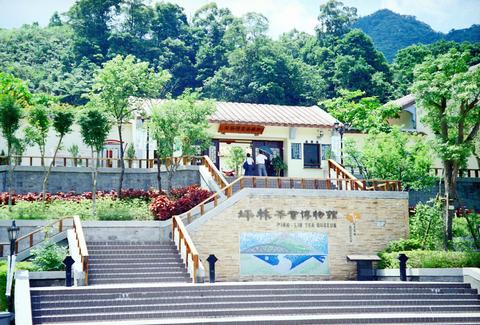
PHOTO: CHANG JU-PING, TAIPEI TIMES
The Pinglin museum covers an area of 0.83 hectares, and its facade, which mixes modern and classical Chinese architecture has enhanced the landscape of a rural district which has few buildings of distinction. Speaking of what has become a major landmark in Pinglin, mayor Liang Ching-sheng (梁金生) said, "It's like a beautiful flower in our town, a cultural symbol, that is surrounded by green leaves." The museum, which cost NT$200 million, attracts 6,000 visitors a year.
Pinglin is one of the few towns in northern Taiwan that are still dedicated to tea cultivation. According to Liang, Pinglin is representative of a traditional tea town in Taiwan. "It's very hard to find such towns in northern Taiwan these days. Most tea towns along the Tamsui River have faded away."
The tea museum, which also incorporates a tea house and a display center for tea-related products, such as tea wine, tea candy and tea cake, is a fascinating repository of tea items.
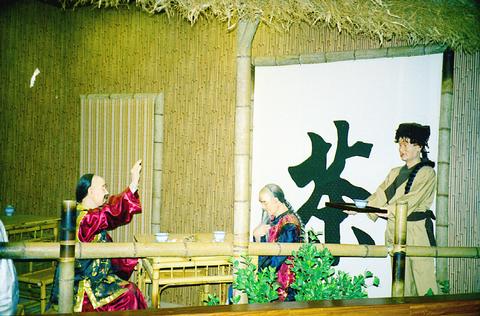
PHOTO: CHANG JU-PING, TAIPEI TIMES
The first-floor exhibition space features exhibits of equipment used for making tea decades ago, along with historical data showing the rise and fall of Taiwan's tea industry. Among other interesting items, this section shows how Taiwan has shifted from being a major tea export country in the early 1970s, to a country that now imports 23,000 tonnes of tea each year. Taiwan's own production is now relatively insignificant in world terms, Liang said.
Liang, who serves as the museum's guide for many of the foreign guests arriving at the tea town, has extensive knowledge of the tea industry's development in Taiwan and loves to share his stories with visitors.
Taiwan began to export its own tea directly abroad at the end of the 19th century, with much of the export business being conducted by major European trading firms such as Swire and Jardine Matheson, which had made their fortunes in the opium trade.
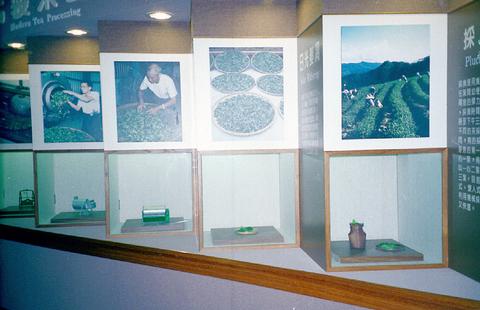
PHOTO: CHANG JU-PING, TAIPEI TIMES
"[The export business was] first based on baihao oolong tea (白毫烏龍茶) and paochung tea, and later on green tea," said Liang. "The tea export business trained the first batch of professionals in Taiwan's export business."
While it may be easy to regard tea as no more than a beverage, the tea museum is living proof that there is a strong educational element that can be conveyed in a fun way to visitors.
"Sometimes we have visitors who are brought here by tour groups and don't show much interest at first. But then they realize there is so much they can learn about tea that they don't want to leave," Liang said.
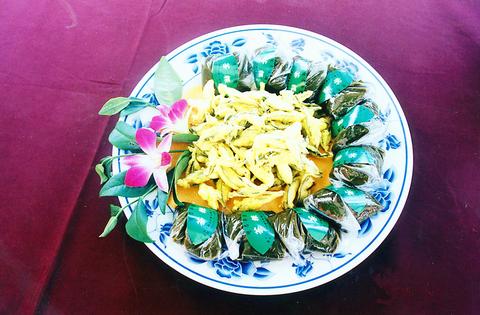
PHOTO: CHANG JU-PING, TAIPEI TIMES
What The Taiwan Ping Lin Tea Museum
Where: 19-1 Songchi Keng, Shuiteh Village, Pinlin Township, Taipei County (北縣坪林鄉水德村聳淒坑19-1號)
Others: Tel (02) 2665-6035. For more information, check http://tacocity.com.tw/plin/. Entry costs NT$100 for adults and is free for children and people over 70
While in Pinglin, check out:
* Tea restaurants
There are four restaurants in Pinglin dedicated to tea-related cuisine. Many of their dishes use tea as a seasoning and many also offer one of the area's best-known dishes, Pure Tea (
* Huliao Tan (
* Yingliang Chih Lu (
* Hehuan Camping (
* Shihfang Cha She (
* Camping and waterfront activities
Pinglin's large camping area has 30 camp grounds under different management, including cabin accommodation for up to 800 people along the Beishih River (
More information about camping in Pinglin can be obtained at the following locations:
* Hsingwang Camping and Recreational Farm
(
* Huliang Tan Camping (
2665-6549.
* Hehuan Camping (
* Yinghsiang Chih Lu (
* Chingshan Farm (
* Pinglin botanical park
Just opened on June 3, the botanical park next to the tea museum covers nearly three hectares and is divided into 14 areas. The park showcases more than 150 kinds of indigenous plants, trees and flowers, and includes a tea farm. A cool, quiet trail running through the park makes an ideal place for a stroll.

“Why does Taiwan identity decline?”a group of researchers lead by University of Nevada political scientist Austin Wang (王宏恩) asked in a recent paper. After all, it is not difficult to explain the rise in Taiwanese identity after the early 1990s. But no model predicted its decline during the 2016-2018 period, they say. After testing various alternative explanations, Wang et al argue that the fall-off in Taiwanese identity during that period is related to voter hedging based on the performance of the Democratic Progressive Party (DPP). Since the DPP is perceived as the guardian of Taiwan identity, when it performs well,

The Taiwan People’s Party (TPP) on May 18 held a rally in Taichung to mark the anniversary of President William Lai’s (賴清德) inauguration on May 20. The title of the rally could be loosely translated to “May 18 recall fraudulent goods” (518退貨ㄌㄨㄚˋ!). Unlike in English, where the terms are the same, “recall” (退貨) in this context refers to product recalls due to damaged, defective or fraudulent merchandise, not the political recalls (罷免) currently dominating the headlines. I attended the rally to determine if the impression was correct that the TPP under party Chairman Huang Kuo-Chang (黃國昌) had little of a

At Computex 2025, Nvidia CEO Jensen Huang (黃仁勳) urged the government to subsidize AI. “All schools in Taiwan must integrate AI into their curricula,” he declared. A few months earlier, he said, “If I were a student today, I’d immediately start using tools like ChatGPT, Gemini Pro and Grok to learn, write and accelerate my thinking.” Huang sees the AI-bullet train leaving the station. And as one of its drivers, he’s worried about youth not getting on board — bad for their careers, and bad for his workforce. As a semiconductor supply-chain powerhouse and AI hub wannabe, Taiwan is seeing
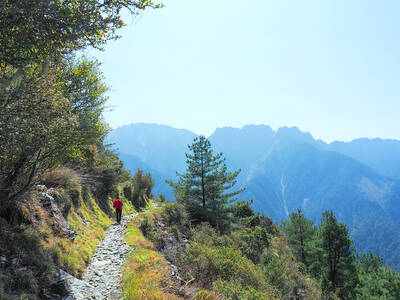
Jade Mountain (玉山) — Taiwan’s highest peak — is the ultimate goal for those attempting a through-hike of the Mountains to Sea National Greenway (山海圳國家綠道), and that’s precisely where we’re headed in this final installment of a quartet of articles covering the Greenway. Picking up the trail at the Tsou tribal villages of Dabang and Tefuye, it’s worth stocking up on provisions before setting off, since — aside from the scant offerings available on the mountain’s Dongpu Lodge (東埔山莊) and Paiyun Lodge’s (排雲山莊) meal service — there’s nowhere to get food from here on out. TEFUYE HISTORIC TRAIL The journey recommences with